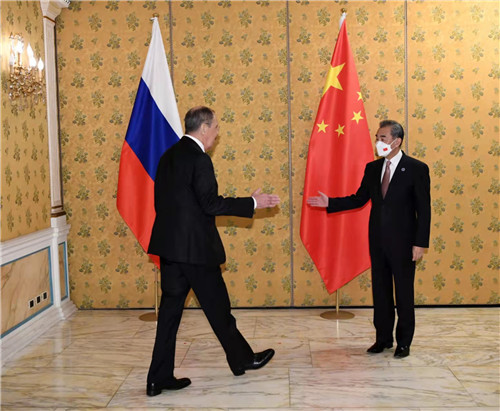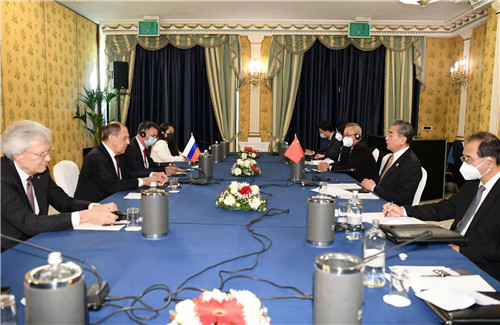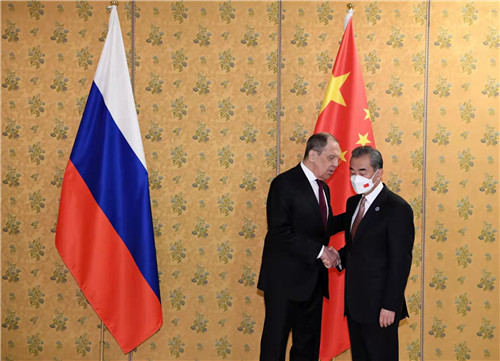Wang Yi Meets with Russian Foreign Minister Sergey Lavrov

On October 30, 2021 local time, State Councilor and Foreign Minister Wang Yi met with Russian Foreign Minister Sergey Lavrov in Rome.
Wang Yi said, the intensive "cloud contacts" between President Xi Jinping and his Russian counterpart Vladimir Putin, and their participation in diplomatic events hosted by the other side via video link in the last two months fully demonstrate the two countries' firm support for each other, effectively promote bilateral pragmatic cooperation, and actively lead major international agendas. China is willing to work with Russia, under the guidance of head-of-state diplomacy, to make good preparations for bilateral high-level exchange in the next stage, so as to push for greater development of China-Russia relations.
Wang Yi said, China highly values President Putin's remarks that China is Russia's most reliable comprehensive strategic partner of coordination. China is willing to work with Russia to promote the building of a new type of international relations and a community with a shared future for mankind, hold high the banner of multilateralism, stay committed to the correct path and oppose dishonest practices such as "small circles", "false democracy" and "new Cold War".

Lavrov said, the recent frequent interactions between the two heads of state have pushed Russia-China relations to a historic new high. Russia is willing to work with China to actively implement the important consensus reached by the two heads of state, prepare well for the meetings between the two heads of state and regular meetings between the two prime ministers, thus promoting more results in cooperation in various fields.
The two sides agreed to strengthen the coordination and synergy of COVID-19 prevention measures to curb the cross-border spread of the pandemic, and meanwhile, provide convenience for personnel exchanges and trade on the premise of regular prevention and control of the pandemic.
The two sides agreed to strengthen communication and coordination under such multilateral frameworks as the United Nations and the Group of 20, and jointly safeguard the norms governing international relations and legitimate rights and interests of the two countries.
The two sides agreed to take China's presidency of the BRICS next year as an opportunity to further deepen BRICS cooperation.
The two sides agreed to carry out cooperation between China and the Collective Security Treaty Organization, strengthen communication and coordination on issues such as the Afghan issue and the Iranian nuclear issue, so as to jointly safeguard regional security and stability.
Both sides expressed grave concerns over the establishment of a trilateral security partnership of AUKUS among the United States, Britain and Australia and over their cooperation on nuclear-powered submarines. Both sides said that the AUKUS is a typical military group, and their attempt to form "small cliques" is unpopular and doomed to fail because it is against the trend of times featuring peace, cooperation and development.
Commenting on the so-called "Leaders' Summit for Democracy", the two sides said, we will make clear our positions and expound correct views on democracy, development and human rights to the international community. Wang Yi emphasized that, democracy is a common value of mankind and a right of people in all countries, rather than an exclusive privilege of a few countries. Forcing other countries to accept a unilaterally recognized so-called "democracy" will only be counterproductive. It is a typical move against democracy to label other countries as "authoritarian" just because they choose different paths to achieve democracy.
Both sides also agreed to maintain strategic communication, assess bilateral cooperation in a timely manner, and coordinate each other's positions and joint actions.

京ICP备18041594号-1
京公网安备 11010202005508号


